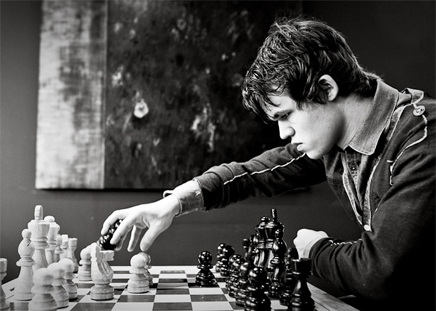Magnus MAGNUS
That means "Magnus the Great." Or, if you prefer, "Great, the Great."
Not that many people follow the game of chess. I get that. It's a highly cerebral game without a high profile. I got back into the game last year after a decade-long hiatus, inspired really by two things.
First, I started following Garry Kasparov on Twitter (@Kasparov63). Kasparov is the greatest chess player probably to ever live. He was ranked the top player in the world for something like 20 years, something nobody else has even approached. While I've enjoyed Kasparov's political Tweeting (he is Public Enemy #1 to Vladimir Putin), his perspective on chess and life has also been fascinating.
The second thing is Magnus Carlsen. The 23-year-old Norwegian is currently the highest rated player in history (yes, surpassing even Kasparov) and, as of a match in November, the reigning World Champion. I was intrigued enough to actually get drawn in to watch his World Championship match, mainly to see if all the hype was true. And it was. Carlsen pretty much destroyed his opponent, then-reigning champion Viswanathan Anand.
Well, all of the news today is going to be taken up by the Super Bowl, one of America's biggest holidays. (I read somewhere that the Super Bowl is only topped by Thanksgiving for American food consumption.)
But that is, frankly, a shame.
Because on Saturday in Zurich, Switzerland, Carlsen pulled off a victory for the ages. So stunning was it that the entire press corps covering the Zurich Chess Challenge gave him a standing ovation. Nobody could really believe it, including Magnus himself. Paired with black against American Hikaru Nakamura (currently ranked #3 in the world) he very quickly found himself in trouble. Big trouble. So strong was Hikaru's king-side attack that the professional chess commentariat universally declared Carlsen's position "hopelessly lost." Magnus thought so, too, but commented later that the point of chess is to extend the game another move, and then another move, and then another. In the aftermath of a stunning victory, we should not lose sight of how dire the situation was. Simply put: chess grandmasters do not lose games in the position Hikaru Nakamura found himself. They just don't.
Except when they do.
A clever Tweeter (@TarjeiJS) captioned this: "The moment Magnus Carlsen realizes he is winning."
Under pressure before the first time control (players get added time after making their 40th move), Nakamura blundered. Not with a terrible move, since grandmasters don't make terrible moves, but rather a sub-optimal move. And literally around five moves later, the commentators seamlessly kept right on using the words "hopelessly lost," except they were referring to Nakamura. It was simply jaw-dropping.
When the dust settled and the major pieces got exchanged, Hikaru was staring at a Queen and six pawns against his Queen, knight, and one pawn. For some perspective, usually when a player at this level has one pawn more than you, you lose. There was simply no way for Nakamura to fend off a six-pawn attack.
There is no doubt Magnus got lucky. But one commentator put it well: "When you get lucky this many times, it is no longer luck."
It isn't just luck. The lesson from Saturday's game is this: to beat Magnus Carlsen you cannot just be better in the opening, or in the middle game, or in the end game. You must be superior every single move. Right now it looks like the list of people up to the task is very, very short, indeed. And there is no way Carlsen's seeming invincibility (he lost all of one game in 2013), vastly strengthened with this stunning victory, doesn't have an immense psychological effect on his remaining challengers.
Magnus is aptly named. For he is truly great.

